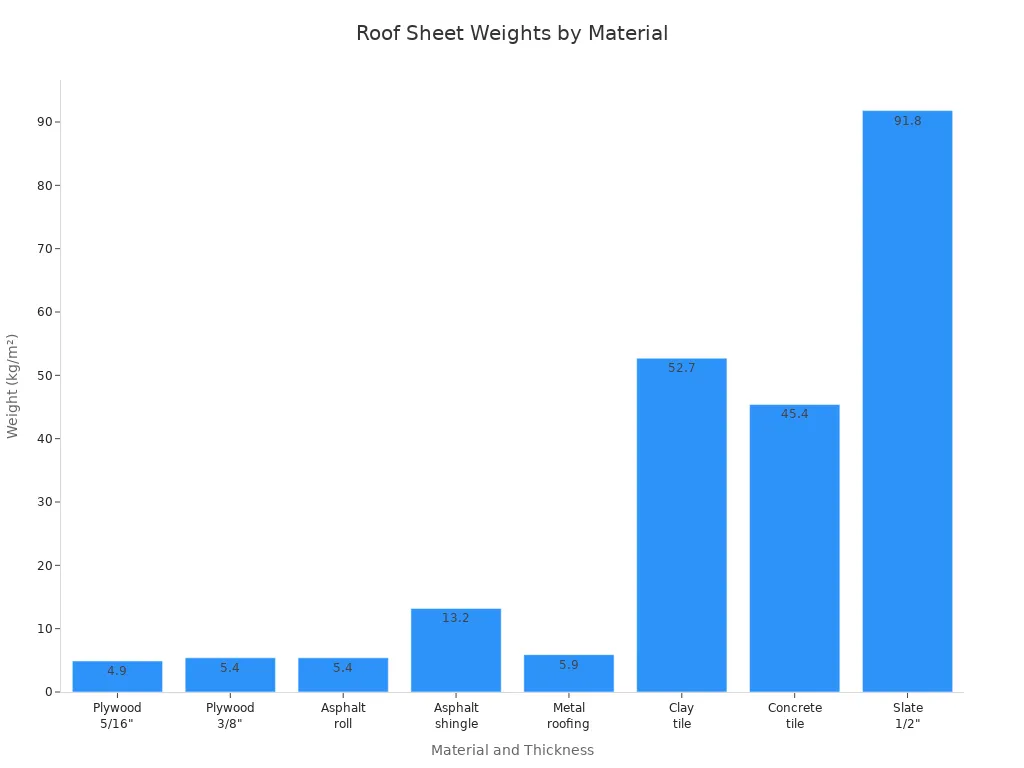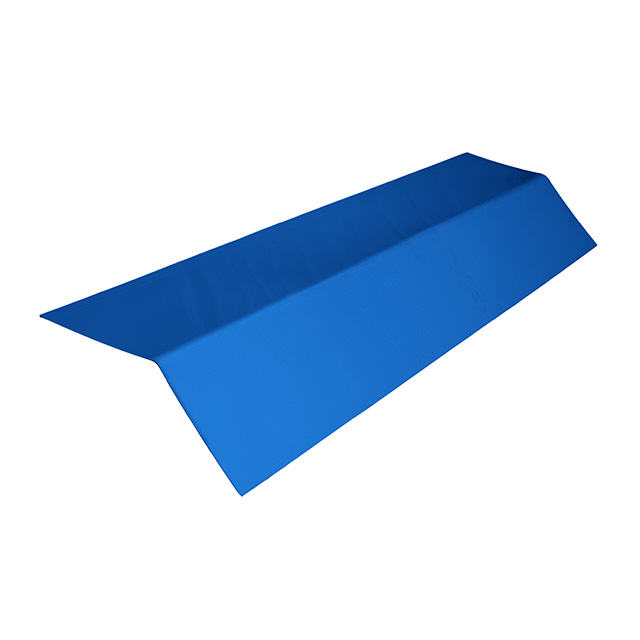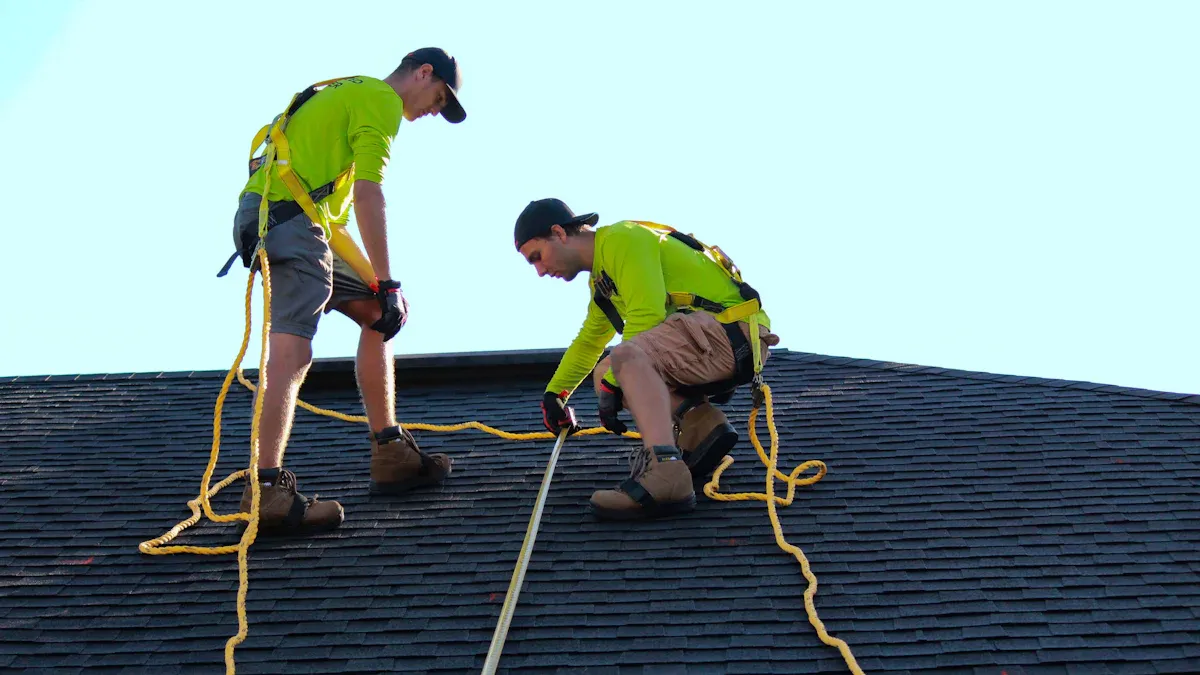close
Choose Your Site
Global
Social Media
Author: Site Editor Publish Time: 2025-10-13 Origin: Site









Material | Weight (lbs/sq ft) |
|---|---|
Clay Tiles | 5.5 - 10 |
Steel | 0.7 - 1.3 |
Aluminum | 0.7 |
Roof sheet weight plays a big role in installation, structure, and weather resistance. Lightweight roof materials help your roof last longer and lower stress on your home.
Learn how much different roofing materials weigh. Light materials, like aluminum and synthetic resin, do not weigh much. Clay tiles are much heavier than these materials.
Think about how the weight of roof sheets changes installation. Sheets that are light are easier to move and put in place. This saves time and lowers the cost of labor.
Look at your roof’s structure before picking heavy materials. Heavy sheets might need extra support to stop damage later.
Use calculators to guess roof sheet weight and price. This helps you plan your money and makes sure your roof can hold the weight.

You need to know the typical weight ranges for roof sheets before you choose a material. The weight of common metal roofing materials, clay tiles, and other options can change how your roof performs. Sheet steel weights and thicknesses play a big role in this decision. Here is a table that shows the average roof sheet weight for popular materials and thicknesses:
Material Type | Thickness | Weight (lbm/ft²) | Weight (kg/m²) |
|---|---|---|---|
Plywood | 5/16" | 1.0 | 4.9 |
Plywood | 3/8" | 1.1 | 5.4 |
Asphalt roll roofing | N/A | 1.1 | 5.4 |
Asphalt shingle | N/A | 2.7 | 13.2 |
Metal roofing (aluminum/steel) | N/A | 1.2 | 5.9 |
Clay tile | N/A | 10.8 | 52.7 |
Concrete tile | N/A | 9.3 | 45.4 |
Slate (1/2" thick) | N/A | 18.8 | 91.8 |
You can see that metal roofing weight is much lower than clay or slate tiles. Sheet steel weight usually falls between 0.7 and 1.3 pounds per square foot, depending on the sheet steel gauge and thickness of the material. Clay tiles can reach up to 10 pounds per square foot, making them much heavier.

Tip: Lighter roof sheets make installation easier and reduce the load on your roof structure.
You must consider several factors when you compare roof sheet weight. The sheet steel gauge, thickness of the material, and size of each sheet all change the total weight. Here are the main things that affect sheet steel weights and thicknesses:
Different metals have unique densities. Aluminum weighs less than steel, so the sheet steel weight for aluminum is lower.
Thicker sheets are heavier. If you pick a higher sheet steel gauge, you get a thinner sheet, which means less weight.
Larger sheets cover more area. The total roof sheet weight increases as you use bigger sheets.
The thickness of the material changes the strength and durability. Thicker sheets can handle more stress but add more weight to your roof.
For example, if you use a galvanized steel sheet that measures 3 feet by 10 feet, and the sheet steel weight is 2 pounds per square foot, you get a total weight of 60 pounds. You multiply 3 by 10 by 2 to find this number.
Regional climate also affects your choice. In areas with salt air and humidity, you need roof sheets that resist rust. DECRA roofing performs well in these conditions and weighs between 1.4 and 1.6 pounds per square foot. In snowy regions, lighter roofs help prevent structural problems. DECRA roofs weigh much less than clay tiles, which can reach 18,000 to 45,000 pounds for a whole roof.
Climate Condition | DECRA Roofing Performance | Weight Comparison |
|---|---|---|
Salt Air and Humidity | Resists rust and oxidation in moist environments | 1.4 to 1.6 lbs/sq ft |
Rain | Protects against water penetration at high speeds | Lighter than conventional materials |
Earthquakes | Reinforced to withstand tremors | Much lighter than clay tiles (18,000-45,000 lbs) |
Snow and Ice | Non-porous, resists freezing and thawing | Average weight of DECRA roofs is 3,700-4,500 lbs |
You should always check the sheet steel gauge and thickness of the material before you buy. This helps you pick the right roof for your climate and building needs.

Synthetic resin roof sheets are light and easy to use. They usually weigh between 4 and 6 kg for each square meter. ASA synthetic resin roof tiles weigh about 5 to 6 kg per square meter.
Product Description | Weight (kg/m²) |
|---|---|
Synthetic Resin Roofing Sheet | 4-6 |
ASA Synthetic Resin Roof Tiles | 5-6 |
Metal roofing sheets are heavier than synthetic resin sheets. Synthetic resin tiles are much lighter than clay or concrete tiles. Because they are lighter, it is easier to put them on your roof. Your roof does not have to hold as much weight.
Material Type | Weight Comparison |
|---|---|
Synthetic Resin Tiles | Significantly lighter |
Clay Tiles | Heavier |
Concrete Tiles | Heavier |
Tip: Lighter sheets help you spend less on work and moving them.
Roma roof sheets are also light. They weigh between 3.36 and 4.48 kg for each square meter.
Weight (kg/㎡) |
|---|
3.36 |
4.48 |
Roma sheets are good if you want a roof that is not heavy. They work well where metal or clay tiles are too heavy.
UPVC roof sheets weigh from 4 to 6.1 kg for each square meter. This makes them simple to move and put on your roof. You pay less for shipping and can finish the job faster. UPVC is strong, so you can use fewer supports. This means your roof system weighs less.
Weight per square meter |
|---|
4-6 kg |
4-6.1 ± 0.1 kg |
Note: Lighter UPVC sheets can help you pay less to install them.
Hollow roof sheets have a special shape to keep them light. For example, 25mm multiwall polycarbonate sheets weigh only 3 kg for each square meter. Solid polycarbonate weighs 7.2 kg, and glass weighs 15 kg for the same size.
Glazing Type | Approx. Weight Per Square Metre |
|---|---|
6mm Glass | 15 kg |
6mm Solid Polycarbonate | 7.2 kg |
25mm Multiwall Polycarbonate | 3 kg |

The hollow design keeps the sheet steel weight low but still holds up to 150 kg for each square meter. Hollow sheets are a good choice if you want a light roof that is still strong.
Translucent roof sheets, like fiberglass panels, weigh about 1.4 kg for each square meter for every millimeter of thickness.
Material Type | Weight (kg/m²/mm) |
|---|---|
Fiberglass Sheets | 1.4 |
These sheets are easy to put on because they are light. If you live where it snows, use thicker panels for more strength. This helps your roof hold more weight, just like a metal roofing sheet with a higher sheet steel weight.
Tip: Light translucent sheets are great for patios, greenhouses, and stores.
ASA PVC tiles are strong and not too heavy. They weigh between 3.8 and 5.7 kg for each square meter.
Weight per Square Meter (kg) |
|---|
3.8 - 5.7 |
ASA PVC tiles are good if you want a roof that is strong but easy to put on. They weigh less than most metal roofing sheets, so your building does not have to hold as much weight.

When you choose a roofing material, roof sheet weight plays a big role in how easy it is to install and handle. Lightweight sheets make your job faster and safer. You can lift and move them without special equipment. Heavy sheets, like thick steel or clay tiles, may need cranes or extra workers. If you use large sheets, you might pay more for shipping and labor. Sometimes, you need a steel weight calculator to figure out if you need extra help. You can use a calculator to estimate the total weight before you start. This helps you plan for the right tools and crew.
Tip: Always use a calculator or a steel weight calculator to check if your team can handle the roof sheet weight safely.
Roof sheet weight affects your building’s structure. Heavy materials put more stress on your roof frame. You must check if your roof can hold the load. If you use heavy tiles or thick steel, you may need to reinforce your roof. A steel weight calculator helps you see if your roof needs upgrades. You should talk to a structural engineer before you install heavy sheets. Sometimes, you need to add supports or change the framing system. If your roof cannot handle the weight, pick lighter sheets. Using a calculator makes it easy to compare options.
Consult a structural engineer to check your roof’s strength.
Reinforce weak areas if needed.
Upgrade framing for heavy roof sheet weight.
Heavy sheets can cause cracks or damage over time. Lightweight sheets help your roof last longer. You can use a calculator to see how much weight your roof can hold. A steel weight calculator also helps you match the sheet steel weight to your building’s needs.
Roof sheet weight changes your project costs. Heavy sheets cost more to ship and install. You may need cranes or special tools. Labor costs go up if the sheets are hard to move. Lightweight sheets save you money on shipping and installation. You can use a calculator to compare costs for different materials. A steel weight calculator helps you see if you need extra support, which adds to your budget.
Roofing Type | Structural Cost Savings |
|---|---|
Lightweight | Significant savings achievable |
Heavyweight | Higher structural costs |
You can use online tools like a roofing calculator, construction calculators, or a metal roofing material and price calculator. These calculators help you plan your budget and choose the best roof for your needs. A steel weight calculator also helps you check if your roof can handle snow or wind. Corrugated metal roofs have high sheet steel weight and work well in snowy areas. Use a calculator to see if your roof can support the load.
Tool Name | Description |
|---|---|
Roofing Calculator | Estimates the area of a roof and the amount of materials necessary for construction. |
Construction Calculators | A collection of calculators for various construction needs, including roofing. |
Metal Roofing Material and Price Calculator | Estimates the number of metal roofing panels needed and optionally calculates material costs. |
Note: Always use a calculator or steel weight calculator to check roof sheet weight and plan for weather performance.
It is important to know how much a roof sheet weighs. The right weight keeps your roof safe and strong. If the material is too heavy, your roof could bend or break. Lighter materials can help you save money and make your roof last longer. The table below shows how different materials compare in weight, price, and how well they handle weather:
Roofing Material | Weight Consideration | Cost | Weather Resistance |
|---|---|---|---|
Asphalt Shingles | Lightweight | Cost-effective | Moderate |
Metal Roofing | Moderate | Higher upfront | Excellent |
Slate and Tile | Heavy | High | Excellent |
Wood Shingles | Moderate | Moderate | Moderate |
Ask a roofing expert for the best advice.
Use a calculator to figure out your roof’s weight.
Make sure your roof follows local building rules.
Tip: Good planning helps your roof stay safe in any weather.